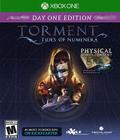Buy Torment: Tides of Numenera
Ask someone who's been steeped in the PC RPG space to come up with a list of greats from the genre, and there's a good chance that Planescape: Torment will be there. Initially, it sold poorly, but high critical acclaim and subsequent discovery of the title over the years have helped it achieve cult status. It also helps that almost everything in the game bucks genre conventions, from your companions to the game mechanics, including a de-emphasis on combat over everything else. It has been over 15 years since that game came out, and while other games borrowed mechanics from it, there hasn't been a proper sequel. After a successful Kickstarter campaign and some delays, Torment: Tides of Numenera stands as a spiritual successor to that game, and this time, it's appearing on consoles and PC.
The game is set in the world of Monte Cook's Numenera, and you're introduced to the Ninth World. The setting is much different from other RPGs, since it is set a billion years into the future, where people and beings from other worlds live in a place where old technology is somewhat magical, since so few people understand it, let alone can repair it. Amidst this, there is a being known as the Changing God, a man who has perfected the art of transferring his soul from one body to another. He casts aside the old one for a much stronger vessel, while the old one somehow gains a soul of its own. You play the Last Castoff, the latest body to be discarded, only to be awoken while freefalling toward the Earth. You survive the crash and wake up knowing only two things: You have no idea who you are, and a monster known as the Sorrow is hunting down Castoffs and the Changing God. You must find out more so you can stop the monster.
One of the things that will sell you immediately on Tides is the world. Your initial impression is that of a medieval world with loads of machinery. There aren't any kingdoms, per se, but knights and cults exist alongside sentient robots and barely functioning terminals. You encounter aliens and beings from other dimensions as well as humans who are slowly changing due to their environment. It won't take long before you board alien vessels and visit a city that exists within a living being. That doesn't count the tremendous amount of backstory you get from talking to all of the named people you meet. The drawback is that there's no way to explore all of that lore outside of those conversations, so there's a good chance of getting lost without taking the time to get more familiar with the Ninth World.
As in many Western RPGs, you start the game by creating your character. Like Tyranny, this begins with some of the choices you make while freefalling and during your recovery process. The answers give you a base character but aren't necessarily your final choices, since you can tweak your character's stats before starting the game. You can choose between the Glaive, Jack, or Nano classes, which respectively translate into Fighter, Rogue, and Wizard. The classes not only determine your starting stats but abilities and weaknesses. For example, Nano classes are terrible with heavy weapons while Glaives are best suited for them. From there, you can modify your stats to provide additional boosts in several categories. Interestingly, while the other two classes are good to go from that point, the Glaive can receive additional training in certain weapon classes before setting forth on their adventure. No matter what you choose, you're still fluid in terms of what you can or can't do, so it isn't unusual to have a very intelligent Glaive or a Jack that can saturate damage.
Once you get out of character creation, you'll quickly realize that the game loves text. You're not going to get anything when you speak to a generically named person, but find someone with a distinct name or title, and you'll get a ton of description text and dialogue. There's enough text that you'll spend a great deal of time reading, so those who are averse to letters will be immediately turned off by this title.
You have a number of questions and actions at your disposal. You can tell the truth, lie, initiate a fight, or let your companions handle things. In any of those situations, you can employ skill points from Intelligence, Might or Speed to increase your chances of success.
The choice system allows for two interesting things. The first is the presence of Tides, which increase or decrease based on the choices you make. It isn't a straightforward morality system where choices are inherently good or evil, as things are more nuanced. In turn, you get many more choices that may differ in intent but sound pretty similar. Due to these choice variants, you have characters in your party who don't hate or love you but are often somewhere in between.
The second interesting thing is that there's no such thing as a bad choice. If you're trying to play for one specific alignment, you'll obviously want to avoid some of the choices, but when faced with any situation, nothing is considered wrong. Start a fight and talk your way out in the middle. Extort someone or find an alternate solution. Dying is a perfectly acceptable solution, since the game provides no game over state. The game is very freeform, but for completionists, this also means that it will take a very, very long time to see all of the combinations since your Tide alignment, prior choices, and party members can open up certain avenues or prevent others from appearing.
While there are various ways to avoid fighting, it can't be avoided entirely. In combat, Tides goes turn-based, with both allies and enemies deciding where to move and when to attack. It plays similar to a strategy game, as positioning makes a big difference in terms of dishing out and receiving damage. Items and Ciphers, which are special items comprised of ancient technology, can eat up points used for movement or attacks. As in the other portions of the game, you can use skill points in combat to improve your chance of a successful hit or dodge. Ciphers can start to generate you negative effects if you hold on to too many at a time, so you're forced to use them almost immediately or share them between party members to avoid those side effects.
Compared to the dialogue sections, the combat can be perceived as weak. Everyone has one point for movement and one for actions, so combat planning feels too simple. There's no undo command, so an accidental execution of any command means a waste of a move. You're always outnumbered in every fight, so even the smallest of skirmishes requires you to wait for quite some time before your turn comes up. Fights are a rarity in Tides, but the system could've used some more tuning.
Beyond the rather weak combat system, there are a few things that affect the game's overall quality. Ally pathing can be quirky, with some not willing to walk around an object or person once a conversation starts. As a result, that person runs in place the whole time. Just like the lore, there's no guide for the various colors of the Tides. You get an explanation that appears periodically in the loading screens, but unless you write them down or have a great memory, you won't understand why a gold or red Tide is so important. The game also has a few crash issues that aren't repeatable, but it's suspect that two or three occur during a playthrough. Finally, while the story pacing is fine for most of the game, it feels rushed toward the end.
The graphics are quite well done. In particular, the environments are the most fascinating thing, since the colors pop in everything you encounter, especially the places you visit later on. There are a number of effects going on, and most areas are rather well populated. Where it all falters, however, is in the actual performance. Depending on the level of camera zoom and the environment, the frame rate can either go beyond 60fps or slow down to the 20s. It doesn't get so bad that things slow to a crawl, but it would help to cap things at 30fps. The game also has issues with frame pacing, as it'll often stop and stutter for no reason. It occurs far too often, and while this title doesn't need fast, twitch-based reactions, it makes the whole thing feel unoptimized.
The sound is mixed in terms of quality, but it is in a much better state when compared to the graphics. Tides is up there with some of the stronger Western RPG soundtracks to date. The music works well in the background to set the mood, and it does a great job of evoking the big journey ahead of you. The effects are fine and nothing misses a beat, but the voices can be questionable. The performances are good, but they can seem random. Both major and minor characters have some lines fully voiced but only for the first paragraph, and subsequent ones get the silent treatment. This is also inconsistent, since voices can appear for both major and minor turning points in the story. Given the amount of dialogue and text in the game, you might wish that the voices were simply removed instead of being there haphazardly.
If you can live with the technical hiccups, Torment: Tides of Numenera is one of the more fascinating RPGs for any platform. The setting is fantastic, with enticing environments and loads of lore to flesh out this RPG world. The focus on dialogue and non-combative solutions is refreshing, especially since the combat can be too simplistic. The game offers many possibilities since there are multiple solutions to any quest. At the same time, the absence of a journal to record things is a disappointment, since the lore can be too deep, and mechanics like the Tides can be rather obtuse. For those looking for something offbeat in their RPGs, Tides is certainly worth checking out.
Score: 8.0/10
More articles about Torment: Tides of Numenera










 Torment: Tides of Numenera is a single-player role-playing game, set in the world of Monte Cook’s tabletop RPG game, that explores deep, personal themes.
Torment: Tides of Numenera is a single-player role-playing game, set in the world of Monte Cook’s tabletop RPG game, that explores deep, personal themes.






















